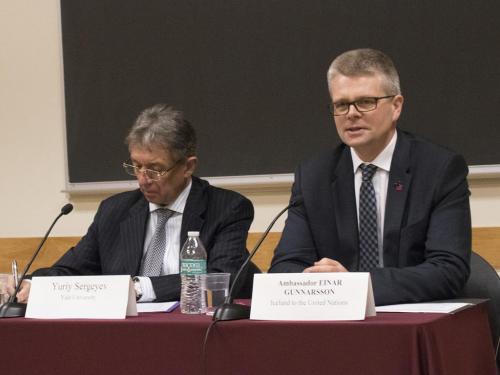
For the full recording of the event
On Monday, December 4, the Global Governance series welcomed Ambassador Einar Gunnarsson, Permanent Representative of Iceland to the United Nations, who discussed the role of the UN regarding human rights protection worldwide.
Ambassador Gunnarsson had invaluable insights on the matter to share with the audience of Yale students and scholars, as well as members of the New Haven community—he currently serves as the Chairperson of the Third Committee of the General Assembly, responsible for discussing social, humanitarian, and human rights issues.
The Ambassador emphasized the uniqueness of the body as the only forum in the world for discussing human rights that has universal membership—as well as the responsibility this entails. “That every country in the world participates, gives it a norm-setting power and the legitimacy that other entities do not have”—he said. Originally, the committee was meant as the body within the UN family to deal with the matter exclusively, with the Human Rights Council and a larger network of bodies only emerging later. What distinguished the role of the Committee within this robust framework for human rights protection, according to Ambassador Gunnarsson, is consensual decision-making, and the ability that representatives of each country have to provide input in the discussion.
The resolutions of the General Assembly are not binding, but as the Ambassador explained, they do “set a direction for treaties and more specific legislation later on.” That is the reason behind language specifics being so extensively debated in the UN, he pointed out—“to untrained ears discussions in the GA might seem to be about minor things, sometimes as little as commas, or verb tenses,” but in a document which carries such a standard-setting weight, every detail counts, and stronger or more progressive wording can make an impact. Gunnarsson recalled a recent discussion the Committee had on the topic of family, “there was a lot of time spent discussing the language because it had the power to suggest whether we are talking about a traditional nuclear model or do we open ourselves to a more progressive, diverse view.”
One important development seen in recent years is the increasing involvement of China—it was only this year that the country called for a vote in the Committee for the first time in history. On the global arena and in the room of the MacMillan Center alike, this sparked a discussion on whether we can expect a shift towards “human rights with a Chinese touch,” and more broadly—whether all human rights are universal or should it be contingent on the cultural context as some countries known for lower standards like to argue. Yuriy Sergeyev, former representative of Ukraine to the UN and currently a lecturer at Yale who moderated the talk, was confident that “we can recognize cultural relativity but not moral relativity,” and that there are consensual limits to what countries are able to raise as a tradition argument.
Ambassador Gunnarsson sees value in the unique platform that the Third Committee provides for dealing with issues which carry enormous weight, as those of human rights protection do. The Ambassador spoke about the UN’s emphasis on consensus—that any country has the right to call a vote and make their perspective heard, guarantees that if a consensus is reached, it can be universally accepted all around the world, he stressed. Both Ambassadors responded to the often-raised criticism of the UN, arguing that soft law and persuasion, despite lacking enforcement mechanisms, are far from being powerless. Again, Gunnarsson pointed to the importance of consensus in setting norms that are to be applied worldwide: “if you vote, it means you are giving up on convincing the other side to work towards standards you believe are morally right,”—he said—“voting is easy, consensus is not.”
Ambassador Gunnarsson was overall optimistic about the efficacy of international dialogue and soft power. “When I was on my way to New York for the first time, a friend called to congratulate me,” he recalled—“When I thanked him, he asked ‘are you really looking forward to it? Diplomates sitting in one room arguing over the same texts over and over and debating the same commas decade after decade?’”
“But imagine,” Gunnarsson replied, “What would the world look like today if these diplomates were not arguing for the last 70 years?”
Written by Weronika Betta, Yale College 2020, Ezra Stiles College

